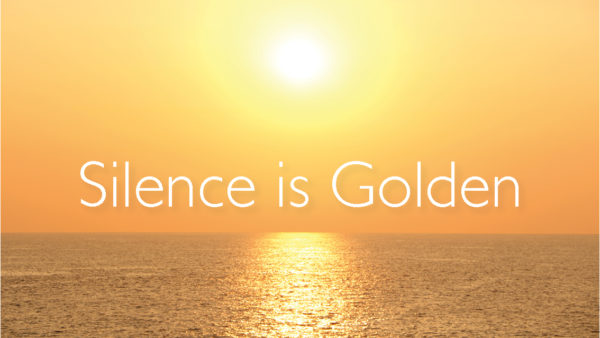“Silence is the sleep that nourishes wisdom.” – Francis Bacon.
We live in such a noisy world, especially if you are in a large city. We are bombarded with many difference sounds throughout the day – some pleasant, some not. It is quite rare to experience true silence. I am lucky enough to live in the beautiful Blue Mountains in NSW, in a particularly quiet space. I spend 1 or 2 days per week in the inner city of Sydney. I love to sit by the harbour and soak up the wonderful sounds emanating from life on the harbour – I even feel very peaceful and quiet, until I get back to the Blue Mountains where true quiet reigns supreme, and realise quiet, stillness and silence is almost impossible to experience in a big city.
WHY SILENCE MATTERS
Research throughout the past century has linked noise pollution to an increase in heart disease and tinnitus. The World Health Organization likened it to a “modern plague” and stated that “there is overwhelming evidence that exposure to environmental noise has adverse effects on the health of the population.”
It is not just the general noise around us, that we have no control over, we actually choose to bombard our body with radio, music, phone, TV, news, podcasts and conversation daily.
As the noise in our lives gets louder, more people are beginning to seek out silence, by meditating for 10-30 minutes a day or attending a silent retreat. In 2011, 100 scientists took part in a silent retreat and discovered that shutting off speech heightens awareness in other areas. They practised vipassana meditation in silence, which aims to promote overall well-being.
10 days in absolute silence is not for everyone but finding time for silence in your life is something that will bring you and your brain much reward.
SILENCE RELIEVES STRESS
Noise has a pronounced physical effect on the brain, which often leads to increased production of stress hormones. Sound waves arrive at the brain in the form of electrical signals via the ear, which the body reacts. In particular, the amygdala (the part of the brain that is associated with memory formation and emotion) is activated, which leads to the release of the stress hormone cortisol.
A 2006 study to feature in the Heart journal showed that silence can release tension in the brain and body in just a couple of minutes. Researchers found silence to actually be more relaxing than listening to so-called “relaxing” music.
SILENCE REPLENISHES MENTAL RESOURCES
The never-ending attention demands of modern living place a significant burden on the prefrontal cortex of the brain, which is involved in high-order thinking, decision-making and problem solving.
All the decision making processes we go through in a day drains these resources. Noise and incessant sound drains it even further. This can affect our focus, to solve problems and to think about new ideas.
Meditating in silence, or in the quiet stillness you find when walking alone in nature, or swimming, gives your brain the chance to let down its sensory guard. We can once again tap into our creativity, we can reflect and enjoy the other restorative benefits. As Herman Melville wrote, “All profound things and emotion of things are proceeded and attended by silence.”
THE BRAIN’S DEFAULT MODE
In silence the brain is disengaged from all that external stimuli, and we get to go deeper into our unconscious mind, rather than being constantly held in the shallow surfaces of the mind, with all of life’s daily distractions.
SILENCE IMPROVES SLEEP
Evidence suggests that periods of silence throughout the day can enhance sleep and lessen insomnia.
SILENCE IMPROVES MEMORY
Simply going for a walk in nature alone can cause brain growth in the hippocampus, which also can lead to better memory function. A 2011 study published in the Proceedings of the National Academy of Sciences showed that adults who walked for 40 minutes three times a week for a year had brain growth in the hippocampus, the area of the brain associated with spatial memory. Silence does this and immersing ourselves in nature helps the brain to have better memory consolidation.
Science says that silence is good for your brain and general health, but common sense also tells us that spending some time in silence (in your mind) each day is good for you.
RECOMMENDATION: If you do not practise any form of meditation and do not spend any time in silence, then do yourself a favour and start right now to experience the enormous benefits. Start slowly, just 5 minutes a day and once you build up to 15 or 20 minutes you will find you cannot live without a regular practice of pure silence in your day.




